| Listing 1 - 10 of 28 | << page >> |
Sort by
|
Book
ISBN: 9781107032576 9781139506717 Year: 2015 Publisher: New York : Cambridge University Press,
Abstract | Keywords | Export | Availability | Bookmark
 Loading...
Loading...Choose an application
- Reference Manager
- EndNote
- RefWorks (Direct export to RefWorks)
Theory of knowledge --- Neo-kantianism. --- Néo-kantisme --- Néokantisme --- Néo-kantisme --- Néokantisme.
Book
ISBN: 8842053325 9788842053323 Year: 1997 Volume: 76 Publisher: Roma : Laterza,
Abstract | Keywords | Export | Availability | Bookmark
 Loading...
Loading...Choose an application
- Reference Manager
- EndNote
- RefWorks (Direct export to RefWorks)
Neo-kantianism --- Philosophy, Modern --- Néo-kantisme --- Philosophie --- Neo-Kantianism. --- Néo-kantisme --- Philosophy, Modern - 20th century.
Book
ISBN: 9783826051494 Year: 2013 Publisher: Würzburg Königshausen und Neumann
Abstract | Keywords | Export | Availability | Bookmark
 Loading...
Loading...Choose an application
- Reference Manager
- EndNote
- RefWorks (Direct export to RefWorks)
Neo-kantianism --- History --- Néo-kantisme --- Histoire --- Philosophy --- Philosophie --- Néo-kantisme
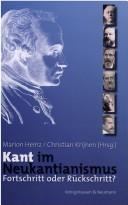
ISBN: 3826032993 9783826032998 Year: 2006 Volume: 23 Publisher: Würzburg : Königshausen & Neumann,
Abstract | Keywords | Export | Availability | Bookmark
 Loading...
Loading...Choose an application
- Reference Manager
- EndNote
- RefWorks (Direct export to RefWorks)
Neo-kantianism --- Néo-kantisme --- Néo-kantisme --- Congresses. --- Congrès --- Kant, Immanuel, --- Néokantisme
Book
ISBN: 2841330346 9782841330348 Year: 1995 Volume: 26 Publisher: Caen Université de Caen
Abstract | Keywords | Export | Availability | Bookmark
 Loading...
Loading...Choose an application
- Reference Manager
- EndNote
- RefWorks (Direct export to RefWorks)
Marburg school of philosophy --- Neo-kantianism --- Ecole de Marburg --- Néo-kantisme --- Néo-kantisme --- Political science --- Science politique --- Philosophy --- Philosophie
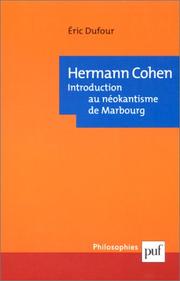
ISSN: 07661398 ISBN: 2130523218 9782130523215 Year: 2001 Volume: 147 Publisher: Paris : PUF - Presses Universitaires de France,
Abstract | Keywords | Export | Availability | Bookmark
 Loading...
Loading...Choose an application
- Reference Manager
- EndNote
- RefWorks (Direct export to RefWorks)
Neo-kantianism --- Knowledge, Theory of --- Marburg school of philosophy --- Néo-kantisme --- Théorie de la connaissance --- Ecole de Marburg --- Ecole de Marburg. --- Philosophie allemande --- Neo-kantisme. --- Néo-kantisme --- Théorie de la connaissance --- Marburg school of philosophy. --- Philosophy, German --- Neo-Kantianism. --- École de Marburg. --- Néo-kantisme. --- Philosophy, German. --- Marburger Schule. --- Neukantianismus. --- Cohen, Hermann, --- 1800-1999. --- Philosophie allemande - 19e siecle. --- Philosophie allemande - 20e siecle.
Book
ISBN: 9780198722205 0198722206 0191789054 Year: 2014 Publisher: Oxford Oxford university press
Abstract | Keywords | Export | Availability | Bookmark
 Loading...
Loading...Choose an application
- Reference Manager
- EndNote
- RefWorks (Direct export to RefWorks)
Frederick C. Beiser tells the story of the emergence of neo-Kantianism from the late 1790s until the 1880s. He focuses on neo-Kantianism before official or familiar neo-Kantianism, i.e., before the formation of the various schools of neo-Kantianism in the 1880s and 1890s (which included the Marburg school, the Southwestern school, and the Göttingen school). Beiser argues that the source of neo-Kantianism lies in three crucial but neglected figures: Jakob Friedrich Fries, Johann Friedrich Herbart, and Friedrich Eduard Beneke, who together form what he calls 'the lost tradition'. They are the first neo-Kantians because they defended Kant's limits on knowledge against the excesses of speculative idealism, because they upheld Kant's dualisms against their many critics, and because they adhered to Kant's transcendental idealism. Much of this book is devoted to an explanation for the rise of neo-Kantianism. Beiser contends that it became a greater force in the decades from 1840 to 1860 in response to three major developments in German culture: the collapse of speculative idealism; the materialism controversy; and the identity crisis of philosophy. As he goes on to argue, after the 1860s neo-Kantianism became a major philosophical force because of its response to two later cultural developments: the rise of pessimism and Darwinism.
History of philosophy --- anno 1800-1899 --- anno 1700-1799 --- Germany --- Neo-kantianism. --- Philosophy, Modern --- Néo-kantisme --- Philosophie --- Kant, Immanuel, --- Influence --- Néo-kantisme --- Influence.
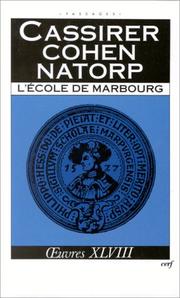
ISSN: 02989972 ISBN: 2204059021 9782204059022 Year: 1998 Volume: 48 Publisher: Paris : Les Editions du Cerf,
Abstract | Keywords | Export | Availability | Bookmark
 Loading...
Loading...Choose an application
- Reference Manager
- EndNote
- RefWorks (Direct export to RefWorks)
Marburg school of philosophy --- Neo-kantianism --- Ecole de Marburg --- Néo-kantisme --- Néo-kantisme --- Critique et interprétation --- Kant, Immanuel (1724-1804) --- Philosophie allemande
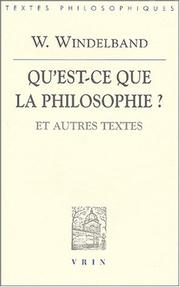
ISBN: 2711615685 9782711615681 Year: 2002 Publisher: Paris J. Vrin
Abstract | Keywords | Export | Availability | Bookmark
 Loading...
Loading...Choose an application
- Reference Manager
- EndNote
- RefWorks (Direct export to RefWorks)
Wilhelm Windelband (1848-1915) est le fondateur de l'école de Heidelberg, l'autre grand courant néokantien qui apparaît au même moment que l'école de Marbourg, et dont Heinrich Rickert et Emil Lask furent des représentants éminents. C'est Windelband qui pose les fondements de la philosophie des valeurs qui caractérise le néokantisme de Heidelberg. Ce volume présente un choix d'opuscules qui relèvent essentiellement de la philosophie de la connaissance, fondement de toute investigation philosophique pour les néokantiens. C'est en effet sur une analyse logique des processus cognitifs que sont fondées non seulement l'assimilation de la vérité à une valeur - sans pour autant que la vérité se dissolve, car Windelband et les autres membres de son école cherchent à fonder la transcendance de la valeur et donc à sauvegarder la vérité comme telle -, mais aussi la théorie de la science qui distingue la méthode " nomothétique " des sciences exactes de la méthode " idiographique " propre à l'histoire.
Neo-kantianism --- Knowledge, Theory of --- Néo-kantisme --- Théorie de la connaissance --- History --- Histoire --- Néo-kantisme --- Théorie de la connaissance --- Philosophie
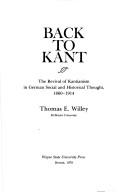
ISBN: 0814315909 9780814315903 Year: 1978 Publisher: Detroit Wayne State University Press
Abstract | Keywords | Export | Availability | Bookmark
 Loading...
Loading...Choose an application
- Reference Manager
- EndNote
- RefWorks (Direct export to RefWorks)
Neo-Kantianism --- Philosophers --- -Scholars --- Idealism --- Transcendentalism --- Baden school of philosophy --- Marburg school of philosophy --- Biography --- -Biography --- Neo-Kantianism. --- Néo-kantisme. --- Philosophes --- Philosophers. --- Neokantianisme. --- Sociologie. --- Geschiedbeschouwing. --- Biographies --- Germany.
| Listing 1 - 10 of 28 | << page >> |
Sort by
|

 Search
Search Feedback
Feedback About
About Help
Help News
News